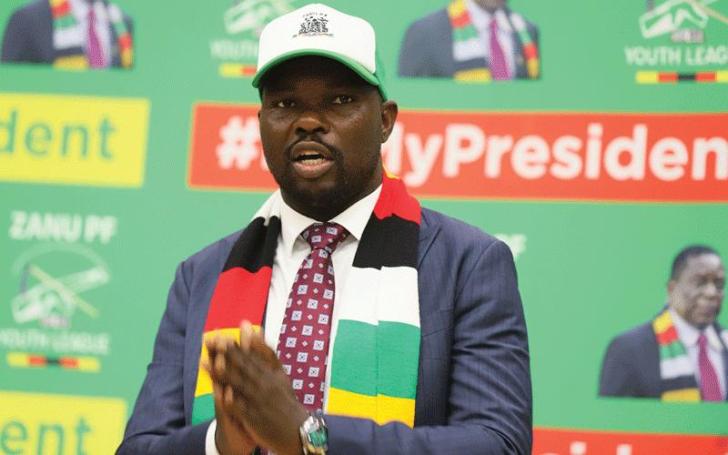News / National
Machakaire's panicked demeanor amplifies concerns about Zanu-PF's stability
14 Feb 2025 at 11:33hrs |
0 Views

Youth Affairs Minister and Zanu-PF Youth League leader Tino Machakaire appeared visibly unsettled yesterday as he publicly defended President Emmerson Mnangagwa amidst rising tensions within the ruling party. The party is increasingly divided over Mnangagwa's leadership, with Vice President Constantino Chiwenga's military-aligned faction reportedly intensifying its opposition.
Machakaire, speaking at a Zanu-PF gathering, made headlines for his shaky and nervous delivery. Struggling to articulate his speech, he mispronounced key terms such as "hoodwinked," which he read as "hookwinked," raising eyebrows about the pressure he faces amid the escalating succession infighting. His anxious display has fueled speculation about the growing fractures within the party and the impact of internal power struggles on its leadership.
The mounting discord within Zanu-PF stems from recent outbursts by war veterans, including Blessed Geza, who have publicly criticized Mnangagwa's third-term bid and his economic management failures. These calls for his resignation have deepened the party's factional divides, pitting Mnangagwa loyalists like Machakaire against Chiwenga's camp.
Machakaire, who hails from Mashonaland East—the same province as Chiwenga—appeared to tread carefully in his speech, seemingly haunted by the fate of former Zanu-PF youth leader Kudzai Chipanga. Chipanga, a vocal member of the G40 faction opposing Mnangagwa before the 2017 coup, was targeted by the military following the coup, alongside other G40 members. The parallels between Chipanga's past and Machakaire's present situation have sparked concern about his political future.
Further complicating Machakaire's position are allegations of an unconstitutional reshuffle within the Youth League. In December 2024, Machakaire announced the appointment of new youth deployees to key portfolios, claiming the changes were necessary to implement resolutions from the Bulawayo annual conference, particularly regarding Mnangagwa's proposed term extension to 2030.
However, Environment, Climate and Wildlife Deputy Minister John Paradza, also a Mnangagwa ally, has vehemently opposed the reshuffle, labeling it unprocedural and divisive. Paradza's objections underscore the extent of internal discontent, even among Mnangagwa's supporters, as the party grapples with leadership succession and third-term ambitions.
The dispute has exposed a web of factionalism within Zanu-PF, with competing interests and agendas creating fractures even among those ostensibly aligned with Mnangagwa. Observers have noted that the infighting reflects deeper struggles over power and control as the party prepares for its next chapter.
Machakaire's panicked demeanor and the brewing conflict over his actions have amplified concerns about the stability of Zanu-PF's leadership. With the specter of factional battles from the past looming large, the party appears caught in a struggle not just for its future direction, but for its very survival as a unified entity.
Machakaire, speaking at a Zanu-PF gathering, made headlines for his shaky and nervous delivery. Struggling to articulate his speech, he mispronounced key terms such as "hoodwinked," which he read as "hookwinked," raising eyebrows about the pressure he faces amid the escalating succession infighting. His anxious display has fueled speculation about the growing fractures within the party and the impact of internal power struggles on its leadership.
The mounting discord within Zanu-PF stems from recent outbursts by war veterans, including Blessed Geza, who have publicly criticized Mnangagwa's third-term bid and his economic management failures. These calls for his resignation have deepened the party's factional divides, pitting Mnangagwa loyalists like Machakaire against Chiwenga's camp.
Machakaire, who hails from Mashonaland East—the same province as Chiwenga—appeared to tread carefully in his speech, seemingly haunted by the fate of former Zanu-PF youth leader Kudzai Chipanga. Chipanga, a vocal member of the G40 faction opposing Mnangagwa before the 2017 coup, was targeted by the military following the coup, alongside other G40 members. The parallels between Chipanga's past and Machakaire's present situation have sparked concern about his political future.
Further complicating Machakaire's position are allegations of an unconstitutional reshuffle within the Youth League. In December 2024, Machakaire announced the appointment of new youth deployees to key portfolios, claiming the changes were necessary to implement resolutions from the Bulawayo annual conference, particularly regarding Mnangagwa's proposed term extension to 2030.
However, Environment, Climate and Wildlife Deputy Minister John Paradza, also a Mnangagwa ally, has vehemently opposed the reshuffle, labeling it unprocedural and divisive. Paradza's objections underscore the extent of internal discontent, even among Mnangagwa's supporters, as the party grapples with leadership succession and third-term ambitions.
The dispute has exposed a web of factionalism within Zanu-PF, with competing interests and agendas creating fractures even among those ostensibly aligned with Mnangagwa. Observers have noted that the infighting reflects deeper struggles over power and control as the party prepares for its next chapter.
Machakaire's panicked demeanor and the brewing conflict over his actions have amplified concerns about the stability of Zanu-PF's leadership. With the specter of factional battles from the past looming large, the party appears caught in a struggle not just for its future direction, but for its very survival as a unified entity.
Source - online
Join the discussion
Loading comments…






































